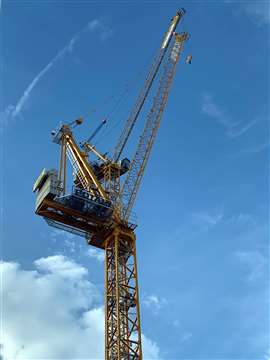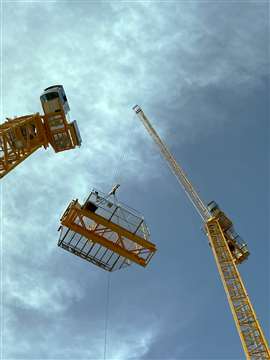World’s first Potain MR 229 erected in UK
15 January 2024
UK-based crane rental company Radius Group recently erected the world’s first Potain MR 229 luffing jib crane in London on a construction project for housing association L&Q Group.
 The Potain MR 229 has a lifting capacity of 14 tonnes. (Photo: Radius Group)
The Potain MR 229 has a lifting capacity of 14 tonnes. (Photo: Radius Group)
Radius Group had already selected four MR 225 A cranes for the project based on the maximum capacity requirement of 2.15 tonnes at full reach but increasing efficiency pressures led the company to swap one of the MR 225 A cranes for an MR 229 as soon as it became available.
Crane specifications
The Potain MR 229 boasts a capacity of 14 tonnes, jib lengths from 30 to 55 metres and a 2.7 tonne tip load at full reach.
An important feature for congested jobsites is the short out of service radius, which is just 10 or 12 metres depending on the jib length.
The crane also offers a choice between two brand-new high-performance hoist winches: the 75HPL35 or the 110HPL35.
For this project, it has been configured with a 50 metre jib and 37.5 metre height under hook and uses a 75HLP35 winch. The three MR 225 A cranes have been configured on fixing angles and with 40 metre jibs.
Tower tech
The MR 229 is the first Potain luffing jib crane to feature Manitowoc’s Crane Control System (CCS), helping to get work done faster and more accurately.
The MR 229 is also the first to include the new Potain Connect telematics system, which streamlines daily tasks, facilitates efficient fleet management, and optimises service and maintenance.
Teddy Holt, operations director at Radius Group, said, “Innovation has always been critical to Radius Group, and this is an exciting milestone for us. Being the first lifting provider in the world to erect an MR 229 on a live construction site is another great example of having a strong focus on continuous improvement.”
 The cranes will remain in operation until Q4 2025, with the project set for completion in 2027. (Photo: Radius Group)
The cranes will remain in operation until Q4 2025, with the project set for completion in 2027. (Photo: Radius Group)
Radius Group will be responsible for managing the cranes throughout the entire project lifecycle, including logistics, erection, operation, and dismantling.
The company said that a key advantage of the choice of cranes is that they will be able to erect and dismantle each other, saving money on mobile cranes.
The cranes will remain in operation until Q4 2025, with the project set for completion in 2027.
STAY CONNECTED


Receive the information you need when you need it through our world-leading magazines, newsletters and daily briefings.




